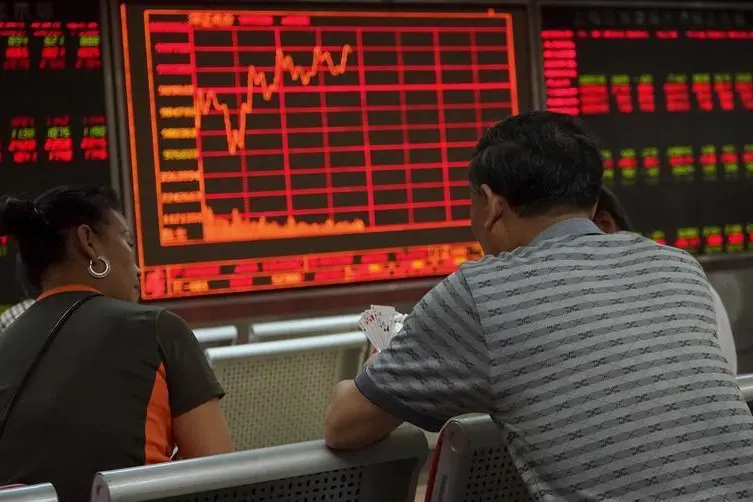PHOTO
- Asian shares follow Wall Street higher early on Monday
- Middle East markets dragged lower by oil prices, but Q2 earnings boost some markets
- Oil prices add gains on possible renewed sanctions on Iran
- Dollar and gold add gains
Global markets
In early trading on Monday, Asian shares added gains after the central bank of China raised late on Friday the reserve requirement on foreign exchange forward positions, making it more expensive to bet against the Chinese currency. Shares in Asia were also boosted by a positive close of the week on Wall Street.
On Friday, United States’ Dow climbed 0.54 percent, the S&P 500 gained 0.46 percent and the Nasdaq Composite added 0.12 percent. They were helped by strong corporate earnings, although gains were capped by worries over the escalating trade tensions.
On Monday, MSCI’s broadest index of Asia-Pacific shares outside Japan climbed 0.2 percent for a second straight session of gains.
“Leaning against bearish CNY (Chines Yuan) sentiment is important because a rapidly weakening currency risks triggering residential outflows and destabilising domestic asset prices,” JPMorgan analysts said in a note, according to a Reuters report.
“Our economists think that PBOC (People's Bank of China) likely will take further action if CNY depreciation continues or capital outflow pressure increases.”
Middle East markets
Stock markets in the Gulf traced a drop in oil prices late last week but positive second quarter earnings boosted some indices in the region.
Saudi Arabia’s index dropped 0.1 percent on Sunday as some Saudi petrochemical companies shed value. Saudi Basic Industries Corporation (SABIC) lost 0.3 percent, while Saudi Kayan Petrochemical Co and Methanol Chemicals Co dropped 1.1 percent and 1.7 percent, respectively.
In Dubai, where the index was up 0.1 percent, most trading volume was concentrated on Drake and Scull International (DSI), which was up 1.4 percent.
Insurers were up in Dubai too, with Takaful Emarat Insurance, the best performing stock, rising 3.3 percent.
The Abu Dhabi index lost 0.1 percent, pulled down by RAK Properties, which on Sunday posted a drop in profit for the first half of the year to 29 million (7.895 million $) dirhams from 61.7 million dirhams (16,797 million $) for the same period one year earlier. Shares in the developer dropped 3 percent.
In Qatar, the index lost 0.9 percent, as Qatari banks – including heavyweight Qatar National Bank - shed value. The lender lost 2.2 percent, while Commercial Bank and Masraf Al Rayan lost 1.5 percent and 1.3 percent, respectively.
Egypt’s index dropped 0.4 percent, Oman’s index added 1 percent, while Kuwait’s index rose 1.1 percent and Bahrain’s index gained 0.3 percent.
Oil prices
Oil prices added gains on Monday as markets anticipated the possibility of renewed sanctions on Iran.
Spot Brent crude oil futures were trading at $73.68 per barrel at 0205 GMT on Monday, up 47 cents, or 0.6 percent, from their last close.
U.S. West Texas Intermediate (WTI) crude futures were up 37 cents, or 0.5 percent, at $68.86 barrel.
Currencies
The dollar edged up early on Monday.
Against a basket of six other currencies, the greenback was up 0.1 percent at 95.259.
Precious metals
Gold prices added gains early on Monday, extending a rally from a 17-month low.
Spot gold was up 0.1 percent at $1,214.76 an ounce at 0056 GMT, building on its 0.5 percent gain on Friday. The metal had also hit its lowest since March 2017 at $1,204 an ounce in the previous session.
U.S. gold futures were little changed at $1,223.4 an ounce.
Gain a deeper understanding of financial markets through Thomson Reuters Eikon.
(Writing by Gerard Aoun; Editing by Shane McGinley)
(gerard.aoun@thomsonreuters.com)
Get this daily morning briefing in your inbox by subscribing here.
Our Standards: The Thomson Reuters Trust Principles
Disclaimer: This article is provided for informational purposes only. The content does not provide tax, legal or investment advice or opinion regarding the suitability, value or profitability of any particular security, portfolio or investment strategy. Read our full disclaimer policy here.
© ZAWYA 2018





















